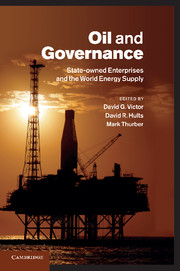Book contents
- Frontmatter
- Contents
- Figures
- Tables
- Boxes
- Contributors
- Acknowledgements
- Part I Introduction
- Part II Thematic studies of national oil companies
- Part III National oil company case studies
- 5 Saudi Aramco: the jewel in the crown
- 6 Oil, monarchy, revolution, and theocracy: a study on the National Iranian Oil Company (NIOC)
- 7 Handcuffed: an assessment of Pemex’s performance and strategy
- 8 Kuwait Petroleum Corporation (KPC): an enterprise in gridlock
- 9 China National Petroleum Corporation (CNPC): a balancing act between enterprise and government
- 10 Petróleos de Venezuela, S.A. (PDVSA): from independence to subservience
- 11 Awakening giant: strategy and performance of the Abu Dhabi National Oil Company (ADNOC)
- 12 Brazil’s Petrobras: strategy and performance
- 13 Sonatrach: the political economy of an Algerian state institution
- 14 Norway’s evolving champion: Statoil and the politics of state enterprise
- 15 Gazprom: the struggle for power
- 16 NNPC and Nigeria’s oil patronage ecosystem
- 17 Fading star: explaining the evolution of India’s ONGC
- 18 Petronas: reconciling tensions between company and state
- 19 Angola’s Sonangol: dexterous right hand of the state
- Part IV Conclusions and implications
- Part V Appendices
- References
- Index
13 - Sonatrach: the political economy of an Algerian state institution
Published online by Cambridge University Press: 05 January 2012
- Frontmatter
- Contents
- Figures
- Tables
- Boxes
- Contributors
- Acknowledgements
- Part I Introduction
- Part II Thematic studies of national oil companies
- Part III National oil company case studies
- 5 Saudi Aramco: the jewel in the crown
- 6 Oil, monarchy, revolution, and theocracy: a study on the National Iranian Oil Company (NIOC)
- 7 Handcuffed: an assessment of Pemex’s performance and strategy
- 8 Kuwait Petroleum Corporation (KPC): an enterprise in gridlock
- 9 China National Petroleum Corporation (CNPC): a balancing act between enterprise and government
- 10 Petróleos de Venezuela, S.A. (PDVSA): from independence to subservience
- 11 Awakening giant: strategy and performance of the Abu Dhabi National Oil Company (ADNOC)
- 12 Brazil’s Petrobras: strategy and performance
- 13 Sonatrach: the political economy of an Algerian state institution
- 14 Norway’s evolving champion: Statoil and the politics of state enterprise
- 15 Gazprom: the struggle for power
- 16 NNPC and Nigeria’s oil patronage ecosystem
- 17 Fading star: explaining the evolution of India’s ONGC
- 18 Petronas: reconciling tensions between company and state
- 19 Angola’s Sonangol: dexterous right hand of the state
- Part IV Conclusions and implications
- Part V Appendices
- References
- Index
Summary
Introduction: overarching themes
The hydrocarbons sector is Algeria’s primary source of economic activity and a major source of revenue for the government. As is evident in most other case studies in this book, the authoritarian Algerian government has sought to promote efficiency within its hydrocarbons sector to maximize revenues to the state without relinquishing control over this industry in Algeria. Its strategy has hinged on a national oil company (NOC), Sonatrach, which is involved in virtually every significant oil and natural gas project in the country. Sonatrach participates in joint ventures with other domestic and foreign hydrocarbons companies, owns several subsidiaries, and has recently developed worldwide operations but these operations are still under the control of the government. Sonatrach is a particularly important player in the natural gas market, though its oil production is significant as well.
Across most of the economy, Algeria has pursued a variety of policy reforms aimed at boosting transparency and economic efficiency. Such reforms have encouraged greater competition and have enhanced the performance of the Algerian hydrocarbons industry, but the government’s strong desire to retain control over this sector explains why these efforts at liberalization are invariably abandoned when they diminish the state’s control over Sonatrach. Despite repeated promises for a more liberalized and market-oriented hydrocarbons industry, the status quo of patronage relationships between Sonatrach and the state usually prevails. To be sure, the relative importance of these pressures – liberalization and control – varies with oil prices and other factors. Moreover, internationalization of the hydrocarbons industry has put pressure on Sonatrach to enhance its efficiency quite apart from particular government policies. Yet the overall strategy and performance of Sonatrach’s activities in the hydrocarbons industry in Algeria remain remarkably the same.
- Type
- Chapter
- Information
- Oil and GovernanceState-Owned Enterprises and the World Energy Supply, pp. 557 - 598Publisher: Cambridge University PressPrint publication year: 2011
- 4
- Cited by

